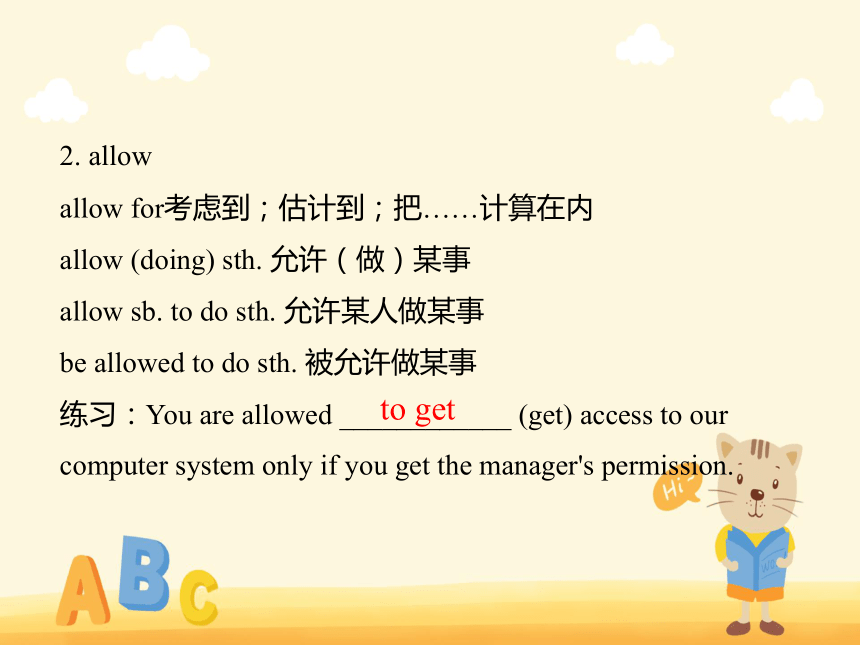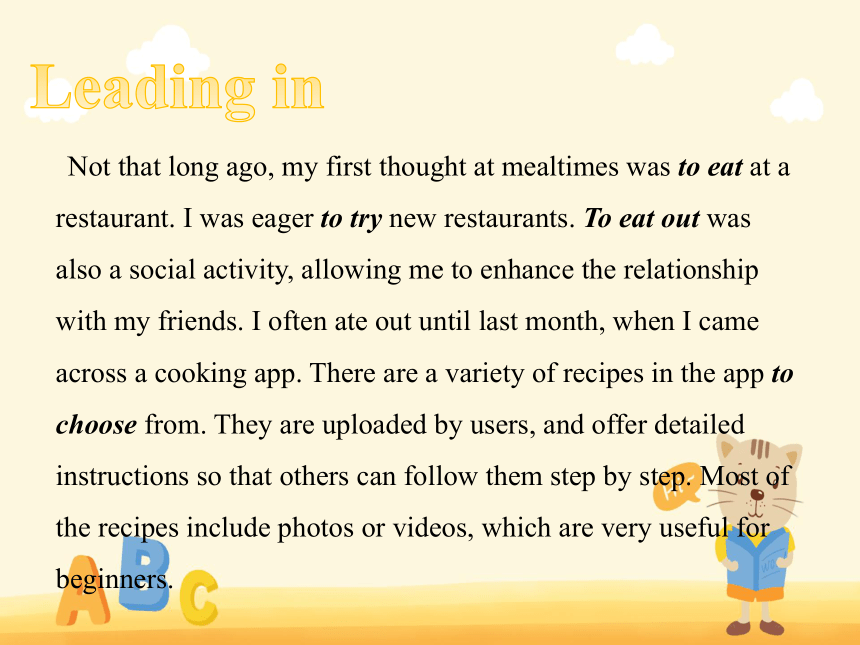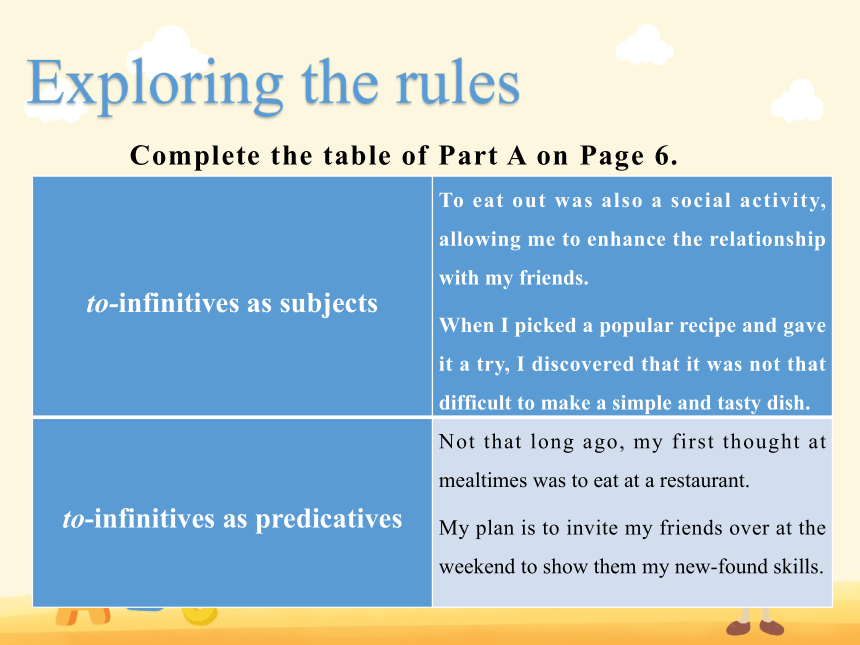译林版(2020)选择性必修第一册Unit 1 Food matters Grammar and usage (教学课件)15张
文档属性
| 名称 | 译林版(2020)选择性必修第一册Unit 1 Food matters Grammar and usage (教学课件)15张 |

|
|
| 格式 | pptx | ||
| 文件大小 | 567.0KB | ||
| 资源类型 | 教案 | ||
| 版本资源 | 牛津译林版(2019) | ||
| 科目 | 英语 | ||
| 更新时间 | 2022-10-12 00:00:00 | ||
图片预览







文档简介
(共15张PPT)
Section B
Grammar and usage
1. eager
be eager for. . . 渴望得到……
be eager to do sth. 渴望做某事
be eager for sb. to do sth. 渴望某人做某事
be eager that. . . 渴望……(从句的谓语动词用“should+动词原形”,should 可以省略)
eagerly adv. 急切地;渴望地,热心地 eagerness n. 渴望,热心
with eagerness 热切地
练习:Many students are eager ___________ (find) a good way to have their written English improved in a short period.
Vocabulary
to find
2. allow
allow for考虑到;估计到;把……计算在内
allow (doing) sth. 允许(做)某事
allow sb. to do sth. 允许某人做某事
be allowed to do sth. 被允许做某事
练习:You are allowed ____________ (get) access to our computer system only if you get the manager's permission.
to get
3. impress
impress sb. with sth. 某物给某人留下深刻的印象
be impressed by/with. . . 被……打动,对……印象深刻
impress sth. on/upon one's memory 某人把某事铭记在心
impress sth. on/upon sb. 使某人意识到某事
impressive adj.给人深刻印象的;令人赞叹的
impression n.印象,感想;影响。
have/get a(n). . .impression of. . . 对……有……印象
make/leave a deep impression on sb. 给某人留下深刻的印象
give (sb.) the impression of/that. . . 给(某人)以……的印象
(be)under the impression that. . . 以为……;(通常指)误认为……
练习:Everyone has unforgettable moments in his life, which leave a deep impression _______ him.
on
Leading in
Not that long ago, my first thought at mealtimes was to eat at a restaurant. I was eager to try new restaurants. To eat out was also a social activity, allowing me to enhance the relationship with my friends. I often ate out until last month, when I came across a cooking app. There are a variety of recipes in the app to choose from. They are uploaded by users, and offer detailed instructions so that others can follow them step by step. Most of the recipes include photos or videos, which are very useful for beginners.
When I picked a popular recipe and gave it a try, I discovered that it was not that difficult to make a simple and tasty dish. In the last few weeks, I’ve thrown myself into home cooking, from boiling noodles in the pot to frying steak in the pan. I hardly eat out any more. Not only is cooking at home cheaper, but I can cook exactly what I want. It’s healthier too. No wonder people say nothing beats home cooking!
Now I am good at cooking a couple of dishes. My plan is to invite my friends over at the weekend to show them my new-found skills. I hope that they will like my cooking!
Exploring the rules
Complete the table of Part A on Page 6.
to-infinitives as subjects To eat out was also a social activity, allowing me to enhance the relationship with my friends.
When I picked a popular recipe and gave it a try, I discovered that it was not that difficult to make a simple and tasty dish.
to-infinitives as predicatives Not that long ago, my first thought at mealtimes was to eat at a restaurant.
My plan is to invite my friends over at the weekend to show them my new-found skills.
动词不定式
作主语和表语
动词不定式作主语
动词不定式做主语时,句子的谓语动词常用单数。
(1)动词不定式做主语置于句首。
To see is to believe. 眼见为实。
To love others is to be loved. 爱人即爱己。
(2)it做形式主语,动词不定式做真正的主语置于句尾,常用于下列句式中:
①It + be+名词+ to do sth.
It is a problem to maintain adequate pension funds.
要维持足够的养老基金是个问题。
②It takes sb. +some time +to do sth.
It took me an hour to repair my bike.
我花了一个小时修理我的自行车。
③It + be+形容词+for sb. +to do sth.,适用于此句型的形容词有 difficult,easy,hard,important,impossible,necessary等。
It's very dangerous for children to cross the busy street.
对孩子们来说,穿过熙熙攘攘的街道很危险。
④It + be+形容词+of sb. +to do sth.,适用于此句型的形容词有careless,clever,good,foolish,honest,kind,lazy,nice,right,silly,stupid,wise等。
It's clever of you to work out the maths problem. =You are clever to work out the maths problem.
你真聪明,解出了这道数学题。
注意:
动词不定式做主语时多数情况下可以用动名词替换,但在以下三种情况下不能替换:一些固定说法中;表示强烈的对比时;表示某一次具体的动作或具体的情况时。
动词不定式作表语
动词不定式做表语,通常用来说明主语的具体内容或者性质。常见的用来做主语的名词有:aim,duty,dream,hope,idea,plan,wish,goal,task,ambition,purpose,work,job等表示目标、意向、计划、任务的词。
My goal is to be a teacher.
我的目标是当一名教师。
Always keep in mind that your main task is to get this company running smoothly.
永远记住:你的主要任务是使这家公司运转顺利。
有些时候,系动词会是appear,seem,prove,tum out,remain等。
Whether we will succeed or not remains to be seen.
我们能否成功仍有待观察。
注意:(1)当主语部分有实义动词do或do的某种形式时,动词不定式做表语时可以省略to。
All I could do now is (to) keep silent. 我现在所能做的就是保持沉默。
(2)动词不定式和动名词做表语都是用于表示主语“是什么”,但动词不定式做表语强调的是一次性的、具体的、将要发生的动作;动名词做表语强调的是一般性的、抽象的、经常发生的动作。
The man's job is to paint the walls.
这位男士的工作是粉刷这些墙。(表示一次性的、具体的、目前要做的事情)
The man's job is painting walls. 这位男士的工作是粉刷墙。(表示经常性的日常工作)
(3)某些动词的不定式与be动词连用时常用主动形式表示被动意义,如be to let(出租),be to blame(应负责任)等。
The house is to let. 这所房子要出租。
Applying the rules
1. The next dish that the cook will prepare is Kung Pao Chicken. (attributive)
The next dish to be prepared by the cook is Kung Pao Chicken.
2. The preparation of home-cooked meals is easy and enjoyable. (subject)
To prepare home-cooked meals is easy and enjoyable.
It is easy and enjoyable to prepare home-cooked meals.
3. Her dream is that she will open a restaurant some day. (predicative)
Her dream is to open a restaurant some day.
4. We will put the potatoes in the pot first in order that they will be cooked quickly. (adverbial of purpose)
We will put the potatoes in the pot first (in order) to cook them quickly.
5. I consider the Soup of the Day as the best option on the menu. (object complement)
I consider the Soup of the Day to be the best option on the menu.
Thank you
Section B
Grammar and usage
1. eager
be eager for. . . 渴望得到……
be eager to do sth. 渴望做某事
be eager for sb. to do sth. 渴望某人做某事
be eager that. . . 渴望……(从句的谓语动词用“should+动词原形”,should 可以省略)
eagerly adv. 急切地;渴望地,热心地 eagerness n. 渴望,热心
with eagerness 热切地
练习:Many students are eager ___________ (find) a good way to have their written English improved in a short period.
Vocabulary
to find
2. allow
allow for考虑到;估计到;把……计算在内
allow (doing) sth. 允许(做)某事
allow sb. to do sth. 允许某人做某事
be allowed to do sth. 被允许做某事
练习:You are allowed ____________ (get) access to our computer system only if you get the manager's permission.
to get
3. impress
impress sb. with sth. 某物给某人留下深刻的印象
be impressed by/with. . . 被……打动,对……印象深刻
impress sth. on/upon one's memory 某人把某事铭记在心
impress sth. on/upon sb. 使某人意识到某事
impressive adj.给人深刻印象的;令人赞叹的
impression n.印象,感想;影响。
have/get a(n). . .impression of. . . 对……有……印象
make/leave a deep impression on sb. 给某人留下深刻的印象
give (sb.) the impression of/that. . . 给(某人)以……的印象
(be)under the impression that. . . 以为……;(通常指)误认为……
练习:Everyone has unforgettable moments in his life, which leave a deep impression _______ him.
on
Leading in
Not that long ago, my first thought at mealtimes was to eat at a restaurant. I was eager to try new restaurants. To eat out was also a social activity, allowing me to enhance the relationship with my friends. I often ate out until last month, when I came across a cooking app. There are a variety of recipes in the app to choose from. They are uploaded by users, and offer detailed instructions so that others can follow them step by step. Most of the recipes include photos or videos, which are very useful for beginners.
When I picked a popular recipe and gave it a try, I discovered that it was not that difficult to make a simple and tasty dish. In the last few weeks, I’ve thrown myself into home cooking, from boiling noodles in the pot to frying steak in the pan. I hardly eat out any more. Not only is cooking at home cheaper, but I can cook exactly what I want. It’s healthier too. No wonder people say nothing beats home cooking!
Now I am good at cooking a couple of dishes. My plan is to invite my friends over at the weekend to show them my new-found skills. I hope that they will like my cooking!
Exploring the rules
Complete the table of Part A on Page 6.
to-infinitives as subjects To eat out was also a social activity, allowing me to enhance the relationship with my friends.
When I picked a popular recipe and gave it a try, I discovered that it was not that difficult to make a simple and tasty dish.
to-infinitives as predicatives Not that long ago, my first thought at mealtimes was to eat at a restaurant.
My plan is to invite my friends over at the weekend to show them my new-found skills.
动词不定式
作主语和表语
动词不定式作主语
动词不定式做主语时,句子的谓语动词常用单数。
(1)动词不定式做主语置于句首。
To see is to believe. 眼见为实。
To love others is to be loved. 爱人即爱己。
(2)it做形式主语,动词不定式做真正的主语置于句尾,常用于下列句式中:
①It + be+名词+ to do sth.
It is a problem to maintain adequate pension funds.
要维持足够的养老基金是个问题。
②It takes sb. +some time +to do sth.
It took me an hour to repair my bike.
我花了一个小时修理我的自行车。
③It + be+形容词+for sb. +to do sth.,适用于此句型的形容词有 difficult,easy,hard,important,impossible,necessary等。
It's very dangerous for children to cross the busy street.
对孩子们来说,穿过熙熙攘攘的街道很危险。
④It + be+形容词+of sb. +to do sth.,适用于此句型的形容词有careless,clever,good,foolish,honest,kind,lazy,nice,right,silly,stupid,wise等。
It's clever of you to work out the maths problem. =You are clever to work out the maths problem.
你真聪明,解出了这道数学题。
注意:
动词不定式做主语时多数情况下可以用动名词替换,但在以下三种情况下不能替换:一些固定说法中;表示强烈的对比时;表示某一次具体的动作或具体的情况时。
动词不定式作表语
动词不定式做表语,通常用来说明主语的具体内容或者性质。常见的用来做主语的名词有:aim,duty,dream,hope,idea,plan,wish,goal,task,ambition,purpose,work,job等表示目标、意向、计划、任务的词。
My goal is to be a teacher.
我的目标是当一名教师。
Always keep in mind that your main task is to get this company running smoothly.
永远记住:你的主要任务是使这家公司运转顺利。
有些时候,系动词会是appear,seem,prove,tum out,remain等。
Whether we will succeed or not remains to be seen.
我们能否成功仍有待观察。
注意:(1)当主语部分有实义动词do或do的某种形式时,动词不定式做表语时可以省略to。
All I could do now is (to) keep silent. 我现在所能做的就是保持沉默。
(2)动词不定式和动名词做表语都是用于表示主语“是什么”,但动词不定式做表语强调的是一次性的、具体的、将要发生的动作;动名词做表语强调的是一般性的、抽象的、经常发生的动作。
The man's job is to paint the walls.
这位男士的工作是粉刷这些墙。(表示一次性的、具体的、目前要做的事情)
The man's job is painting walls. 这位男士的工作是粉刷墙。(表示经常性的日常工作)
(3)某些动词的不定式与be动词连用时常用主动形式表示被动意义,如be to let(出租),be to blame(应负责任)等。
The house is to let. 这所房子要出租。
Applying the rules
1. The next dish that the cook will prepare is Kung Pao Chicken. (attributive)
The next dish to be prepared by the cook is Kung Pao Chicken.
2. The preparation of home-cooked meals is easy and enjoyable. (subject)
To prepare home-cooked meals is easy and enjoyable.
It is easy and enjoyable to prepare home-cooked meals.
3. Her dream is that she will open a restaurant some day. (predicative)
Her dream is to open a restaurant some day.
4. We will put the potatoes in the pot first in order that they will be cooked quickly. (adverbial of purpose)
We will put the potatoes in the pot first (in order) to cook them quickly.
5. I consider the Soup of the Day as the best option on the menu. (object complement)
I consider the Soup of the Day to be the best option on the menu.
Thank you
同课章节目录
- Unit 1 Food matters
- Welcome to the unit
- Reading
- Grammar and usage
- Integrated skills
- Extended reading
- Project
- Unit 2 The Universal Language
- Welcome to the unit
- Reading
- Grammar and usage
- Integrated skills
- Extended reading
- Project
- Unit 3 The art of painting
- Welcome to the unit
- Reading
- Grammar and usage
- Integrated skills
- Extended reading
- Project
- Unit 4 Exploring poetry
- Welcome to the unit
- Reading
- Grammar and usage
- Integrated skills
- Extended reading
- Project
